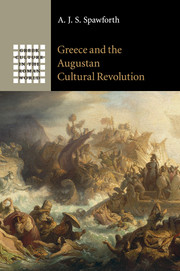Book contents
- Frontmatter
- Contents
- Illustrations
- Acknowledgments
- Chapter 1 Introduction
- Chapter 2 ‘Athenian eloquence and Spartan arms’
- Chapter 3 ‘The noblest actions of the Greeks’
- Chapter 4 ‘The gifts of the gods’
- Chapter 5 ‘Constructed beauty’
- Chapter 6 Hadrian and the legacy of Augustus
- Conclusion
- Bibliography
- Index
- References
Chapter 4 - ‘The gifts of the gods’
Published online by Cambridge University Press: 05 November 2011
- Frontmatter
- Contents
- Illustrations
- Acknowledgments
- Chapter 1 Introduction
- Chapter 2 ‘Athenian eloquence and Spartan arms’
- Chapter 3 ‘The noblest actions of the Greeks’
- Chapter 4 ‘The gifts of the gods’
- Chapter 5 ‘Constructed beauty’
- Chapter 6 Hadrian and the legacy of Augustus
- Conclusion
- Bibliography
- Index
- References
Summary
Before augustus
The impact of Augustus on the civic religion of Greece, the subject of this chapter, must briefly be set, first of all, in the larger context of a degree of mixing of Roman and Greek religion already detectable in the republic. In the Pro Flacco Cicero includes religion (religio) among the blessings of civilisation which the Athenians originated and then gifted to the rest of the world. By the first century bc there was, then, a Roman tendency to view Athens, and Greece more generally, as a kind of religious motherland, a tendency fed by increasing Roman knowledge of – as the elder Pliny later put it – ‘all the legendary lore of Greece and likewise its glorious literature’ (omnis Graecia fabulositas sicut et litterarum claritas). As we shall see, for Romans some of the mythical stories constitutive of this fabulosity contained, or allegorised, powerful truths about mos and about the divine origins of humanitas, civilisation.
This religious convergence was encouraged by the fact that Romans of the republic already felt, as it were, ‘at home’ in Greek religion, in the sense that they lived with a traditional strand in their own religious system which they had conceptualised, at least since the third century bc, as ‘Graeca sacra’ or ‘Graecus ritus’. That is, the official religion of the Roman republic incorporated old cults, including those of Apollo, Hercules, Saturn and Ceres, which the Romans considered as partly or wholly Greek in origin and which they sometimes celebrated according to the ‘Greek rite’. This mixed Roman ritual with Greek practices such as offering tithes (decumae), wearing wreaths and uttering Greek words. There were also long-standing traditions of intermittent Roman contact with sanctuaries in Greece, including Epidaurus, where the Romans had sought out the healing god Asclepius in 291 bc, instituting a branch of his cult on the Tiber island, and the oracle of Delphi, consulted officially for the last time in 204 bc.
- Type
- Chapter
- Information
- Greece and the Augustan Cultural Revolution , pp. 142 - 206Publisher: Cambridge University PressPrint publication year: 2011



